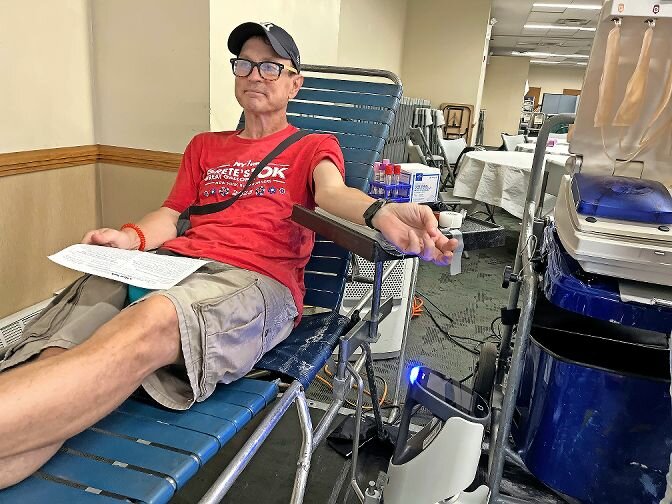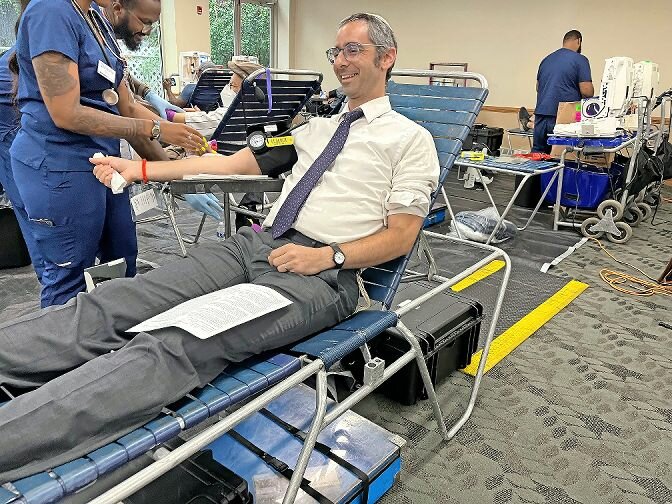Hebrew Institute of Riverdale collects 100 pints of blood in one day
Drive was dedicated to 9/11, Israeli defense vets, and long-time donors
Usually when you see blood it is a cause for alarm and apprehension. That was not the case last Sunday at the Hebrew Institute of Riverdale where people donated more than 100 pints of blood by the end of the day.
According to the American Red Cross, someone in the U.S. needs blood or platelets every two seconds. Getting that can make the difference in treating someone with cancer, chronic illnesses, or traumatic injuries, which is why blood drives are so important.
“Blood can only be given by another human. It cannot be produced in a lab. It can’t be ordered off Amazon,” said Doreen Fiscina, manager of business development at New York Blood center.
Within just two hours of starting the blood drive, there were already about 50 people who had come to donate. Whole blood and double red cell donations go into a centrifuge where it gets separated out. The act of drawing a pint of blood only takes about 10 minutes. And the best part? Those pints are regenerated and refreshed.
“Our supply is in constant need,” said Natasha Chattar, account manager for New York Blood Center. “What we tend to see is a lot of people don’t come back to donate as frequently as they should or they could. But every 56 days if someone does come out to donate, we’d be able to have a nice sustainable supply. But there’s always a need. On a daily basis we do need about 2,000 units of blood to help supply our area hospitals in New York, New Jersey, and Connecticut.”
For people who may be nervous to give blood, Chattar says the best thing to do is to be prepared. You can do this by making sure you eat, stay hydrated and get a good night’s rest. In addition, she recommends bringing a friend and something to keep you entertained like music, a podcast, or even a Netflix show.
Seryl Ritter, primary blood coordinator of the drive, said one of the biggest challenges is getting people to make an appointment beforehand so that they can control the amount of staff needed.
To donate blood you must be 17 to 74. For 75 and older you need a doctor’s note saying you can donate. If you are 16, you can donate blood with parental consent, which is exactly what recently turned 16-year-old Peri Teten did.
“My sister did it last year,” Teten said. “And it’s a way that I can bring help to other people. It’s a cool experience, I’ve never done it before. I don’t really like needles. But I guess it’s a way that I can contribute.”
Teten said getting her blood drawn was just a small pinch and that she didn’t feel anything afterwards. For those who might be scared she recommends not looking or holding their mom’s hand.
“Our mission as a synagogue is to kind of help the world in every way we can,” said Hebrew Institute of Riverdale Rabbi Steven Exler . “Giving is what saves lives. So being able to be a place where people can come and do life-saving activities is especially meaningful right on the eve of 9/11.”
For the past few years the Hebrew Institute of Riverdale has been hosting blood drives in memorial of the victims of the Sept. 11, 2001 terrorist attacks. Kids wrote thank you letters to FDNY and NYPD and gave packets of chocolate. This year the blood drive was also dedicated to disabled and wounded Israel Defense Forces veterans. Donors were invited to write Shana Tova cards to them to commemorate Rosh Hashanah and Yom Kippur.
One veteran donors could write cards to was Oren Blitzblau, an Israeli man who served in the Paratroopers Brigade and Intelligence Corps. In 2005, Blitzblau was wounded when a suicide bomber detonated a bomb. He suffered severe damage to his internal organs, sustained burns all over his body, and impaired hearing and loss of vision. These wounds did not stop the veteran from crossing the finish line of the Iron Man competition in Sweden in 2018 as the only blind participant.
Another veteran donors could donate to was Capt. Ra Ben Attia, an operations officer in the Nahal Brigade during the Operation Protective Edge in 2014. When leading his men into a tunnel, Attia was suddenly shot in the thigh and hip by a sniper. Several life saving surgeries and an emergency operation removing the bullet, allowed Attia to recover. Like Blitzblau, Attia was able to take part in an Ironman competition. In 2016, just two years after he was shot, Attia completed a triathlon and a five-day Courage in Motion bike rides.
The blood drive was also dedicated to long-time blood donors Jean Schneider and her husband Phil.
Jean, a psychiatric social worker at a Bronx children’s psychiatric center, got emotionally invested in blood donations when 12 years ago she saw a flyer asking for platelet donations for a 6-year-old girl who was suffering from a rare type of cancer. To Jean’s dismay, the Sloan Kettering Blood Bank where they were accepting donations for the girl was empty.
She created a community wide campaign to make sure the girl would have platelet donors on a daily basis.
“I decided that this family had so much going on, I would take over the job of making sure there were two blood donors for platelets everyday for this little girl,” Jean said.
There were 382 platelet donations over the course of 18 months. As a result of Jean, donors, and medical staff, the girl was recently able to graduate from SAR and was accepted at Harvard University.
“Think about the people who desperately need it,” Jean said. “People who are at the mercy of donors’ blood.”
This year Jean was not able to attend the blood drive at the institute. In 2021, she was hospitalized and diagnosed with a rare nuero-muscular auto-immune disease that now makes her the recipient. She warns others that any person can suddenly be on the receiving end of needing a blood transfusion.
For that reason she says people on the giving end should take advantage of giving while they can.
Ritter told The Press she was informed that by the end of the drive on Sept. 10 there were about 121 donors registered and that they collected 105 pints of blood. One pint of blood can save three lives.









